Private Equity Operational Due Diligence Trends - Navigating the Path Forward
THE RISE OF PRIVATE EQUITY OPERATIONAL DUE DILIGENCE
Introduction:
Private equity has been in the news recently of late. With U.S. presidential candidate Mitt Romney's past experiences at Bain Capital, it has focused the U.S. discussion on the social and economic benefits of private equity including its effect on job creation. Regardless of any social or political criticisms, investors continue to invest in private equity funds. As allocations to private equity funds continues to increase, so too does the level of scrutiny investors incorporate into this process. Spurred perhaps by developments in other parts of the alternative investment spectrum, most notably hedge funds, investors have begun to look inward and expand the scope of their own due diligence processes. This study seeks to evaluate investor trends in performing operational due diligence on their private equity investments. Operational due diligence refers to the process of analyzing operational risks. Operational risks can be thought of in part, as those risks that are not purely investment related in nature and arise from the daily management and business operations of the fund. These operational risks run the gamut from traditional back office trade operations to counterparty and compliance related risks.
Study Approach:

To analyze Limited Partner attitudes and trends with regard to performing operational due diligence reviews of private equity funds, Corgentum Consulting conducted a survey of approximately 150 Limited Partners globally. The types of investors included in this study covered a diverse cross section of private equity investors ranging from ultra-high net worth individuals to larger institutional investors. The one requirement to be included in this study was that the investors had either current investments in private equity, or had made an allocation to private equity within the past five years.
THE CURRET LANDSCAPE:
Current performance of operational due diligence:
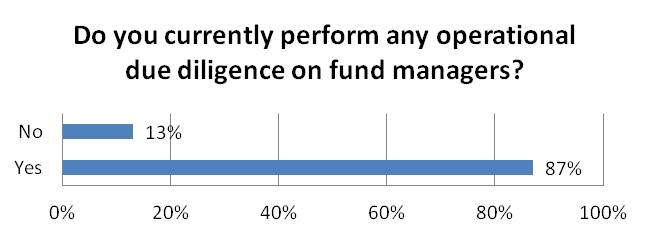
To analyze Limited Partner attitudes and trends with regard to performing operational due diligence reviews, Limited Partners were first asked if they currently conducted operational due diligence on fund managers. As indicated above, the results indicate that the overwhelming majority, 87%, currently perform some sort of operational due diligence.
CURRENT OPERATIONAL DUE DILIGENCE APPROACHES:
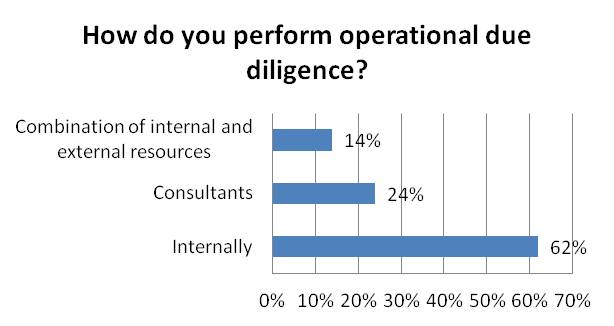
Those Limited Partners that indicated that they currently perform operational due diligence were next asked how they perform this function. As outlined above, the bulk of investors, 62%, currently perform operational due diligence internally.
Those Limited Partners that performed operational due diligence internally further indicated that the majority of the employees responsible for overseeing operational due diligence had other responsibilities (including investment analysis duties) and therefore, were not dedicated to operational due diligence alone. 24% of investors responding indicated that they utilize consultants. Within the consultants category, investors indicated an increase in the use of third-party operational due diligence consultants. However, in general, the consultants which provided operational due diligence also provided investment advice. Finally, 14% of respondents indicated that they perform operational due diligence through a combination of a variety of internal and external resources.
OPERATIONAL RISK ATTITUDES:
Private equity compared to hedge funds:
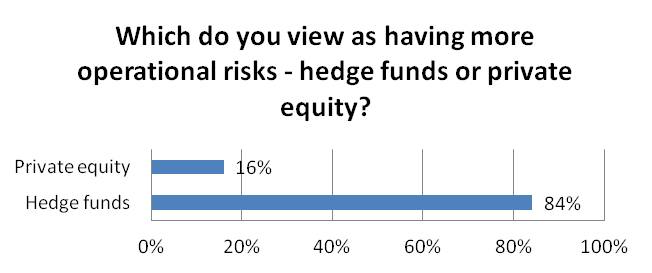
Investors were next asked about their opinion regarding the overall operational riskiness of hedge funds as compared to private equity funds. As outlined above, an overwhelming 84% of investors indicated that they viewed hedge funds as having more operational risks as compared to private equity funds. Respondents clarified that reasons for this included hedge funds more frequent trading activity as compared to private equity funds, the increased attention from regulators on insider trading activity and recent hedge fund related frauds such as Bayou and Madoff.
Resource allocation of operational due diligence to hedge funds versus private equity -
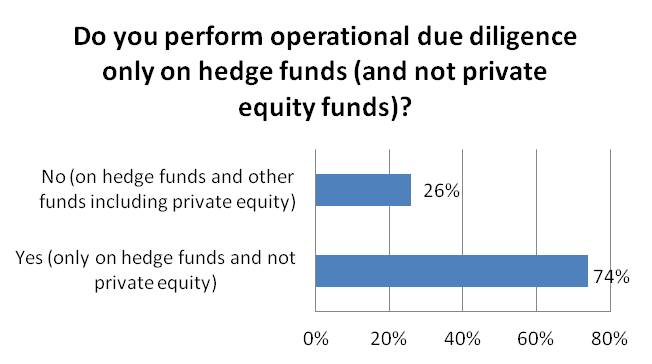
Those respondents that indicated they currently performed operational due diligence, were then asked about whether they performed operational due diligence reviews of their hedge fund investments and not their private equity fund investments. A vast majority, 74% of respondents, indicated that they only perform such reviews on hedge funds and not private equity funds. This response agrees with the respondents previous responses that they view hedge funds as being riskier, and therefore requiring more operational due diligence, as opposed to private equity funds.
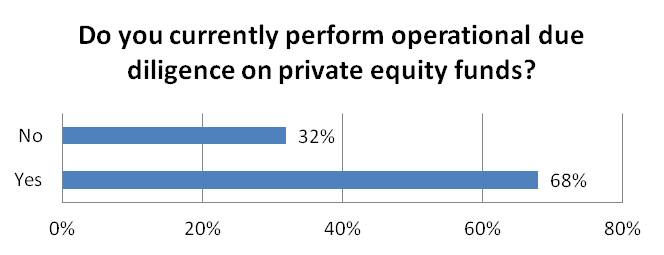
Of those 26% of investors that indicated they performed operational due diligence on other funds in addition to hedge funds - these respondents were asked if they currently perform operational due diligence on private equity funds as well. As outlined above 68% of those in that group indicated that that they did perform such reviews.
ATTITUDES TOWARDS PRIVATE EQUITY OPERATIONAL DUE DILIGENCE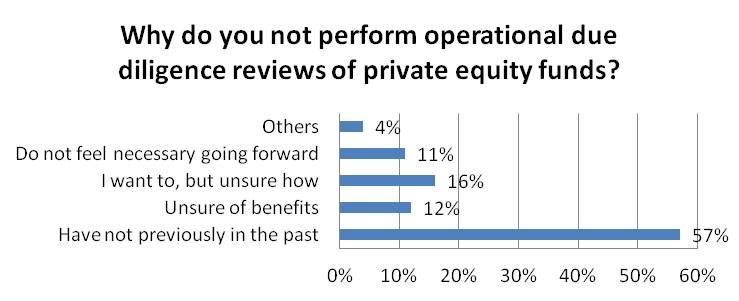
Those respondents that indicated that they did not perform operational due diligence on private equity funds, but did perform such reviews on hedge funds (i.e.- 74% of those that indicated Yes), were asked about their reasons for not performing such private equity reviews. A majority of respondents, 57%, indicated that they had simply not performed such reviews in the past and therefore, had not changed their previous procedures. 12% of investors were unsure as to the benefits of performing such reviews, while 16% indicated that they wanted to perform such reviews but were unsure how to proceed. 11% of respondents stated that they do not feel private equity poses risks which make such reviews necessary going forward. Finally, 4% indicated other reasons for not performing such reviews including a lack of resources and a belief that government regulation supplants the need for such reviews.
ANTICIPATION OF FUTURE TRENDS IN OPERATIONAL DUE DILIGENCE RESOURCE ALLOCATION


Additionally, those 74% that responded they did not perform operational due diligence on private equity funds but did perform such reviews on hedge funds, were further asked if they anticipated performing such operational risk review on private equity in the coming year. As outlined above, 68% of them indicated they did anticipate starting to perform such reviews in the coming year. Investors indicated that the reasons for likely starting to perform such reviews includes a focus on performing a minimum amount of due diligence across all types of investments across their portfolios, increased pressure to perform such reviews from individuals that they manage money on behalf of and increasing concerns about private equity risks in general.
OPINIONS REGARDING IMPORTANT PRIVATE EQUITY OPERATIONAL RISKS
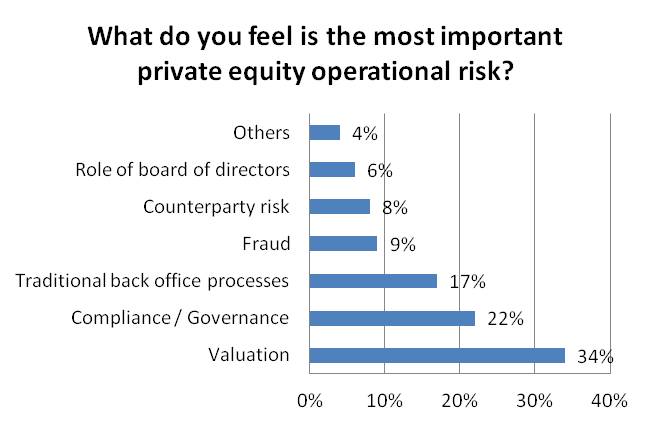

Regardless of whether or not investors indicated that they performed private equity operational due diligence reviews, respondents were asked what they felt were the most important private equity operational risks. The majority, 34% of investors, stated that they believe that valuation was the largest operational risk in private equity. This was followed by, 22% of respondents who indicated that they felt Compliance / Governance was the largest operational risk. 17% indicated that traditional back office procedures posed the largest operational risk to private equity.
Interestingly, investors next indicated that concerns still persist related to fraudulent activity; with 9% of respondents indicating that fraud was the most important private equity operational risk. 8% of respondents felt that
counterparty risk was the most important operational risk, while 6% indicated that the role of the board of directors was the most important risk. 4% of respondents indicated that they felt other risks were the most important, including the compensation of the fund manager, legal documentation risk, service providers and insurance coverage.
Further clarifying their responses, investors indicated that in determining which operational risk factors were the most important, they were influenced in part by the occurrence of recent events where funds had failed for primarily operational related reasons including fraudulent activity, valuation concerns and counterparty risk. These responses, confirmed by the data, suggest the continued presence of a so-called Madoff Effect across not only hedge funds, but private equity as well, whereby investors tend to tailor their approach towards due diligence based on recent fraudulent activity.
CONCLUSIONThe state of operational due diligence is in flux. Private equity Limited Partners are increasingly accepting the need to perform these types of operational risk reviews. Additionally, private equity investors are broadening the scope and depth of such operational risk reviews. In summary, the results of this survey indicate:
- The majority of investors, 87% currently perform operational due diligence reviews of fund managers
- Investors are currently allocating the bulk of their operational due diligence efforts towards hedge funds as opposed to private equity, but there is an increasing sentiment among investors to change this
- Limited Partners anticipate performing more operational due diligence on private equity then they did in the past :
- Approximately 50% of respondents indicated that they anticipate starting to perform such reviews in the coming year
- 16% indicated that they want to implement operational due diligence programs in the future
- In regards to operational risks, Private equity Limited Partners are most focused on valuation and compliance related risks
- Limited Partners are still concerned with the potential for fraud in private equity:
- 9% think it's the most important operational risk
Operational risk evaluations will continue to remain an important part of the private equity investing process. Investors looking to develop or refine their operational due diligence program may consider working with a third-party operational due diligence consultant such as Corgentum, to assist in this process to ensure all operational risks are fully vetted.
ABOUT CORGENTUM CONSULTINGCorgentum Consulting is a specialist consulting firm which performs operational due diligence reviews of fund managers. The firm works with investors including fund of funds, pensions, endowments, banks and family offices to conduct the industry's most comprehensive operational due diligence reviews. Corgentum's work covers all fund strategies globally including hedge funds, private equity, real estate funds, and traditional funds. The firm's sole focus on operational due diligence, veteran experience , innovative original research and fundamental bottom up approach to due diligence allows Corgentum to ensure that our client's avoid unnecessary operational risks. Corgentum's Managing Partner, Jason Scharfman, is the author of the forthcoming Private Equity Operational Due Diligence: Tools to Evaluate Liquidity, Valuation and Documentation The Web site is http://www.Corgentum.com
Private Equity Operational Due Diligence Trends - Navigating the Path Forward
Corgentum Consulting (1,034Kb PDF)
